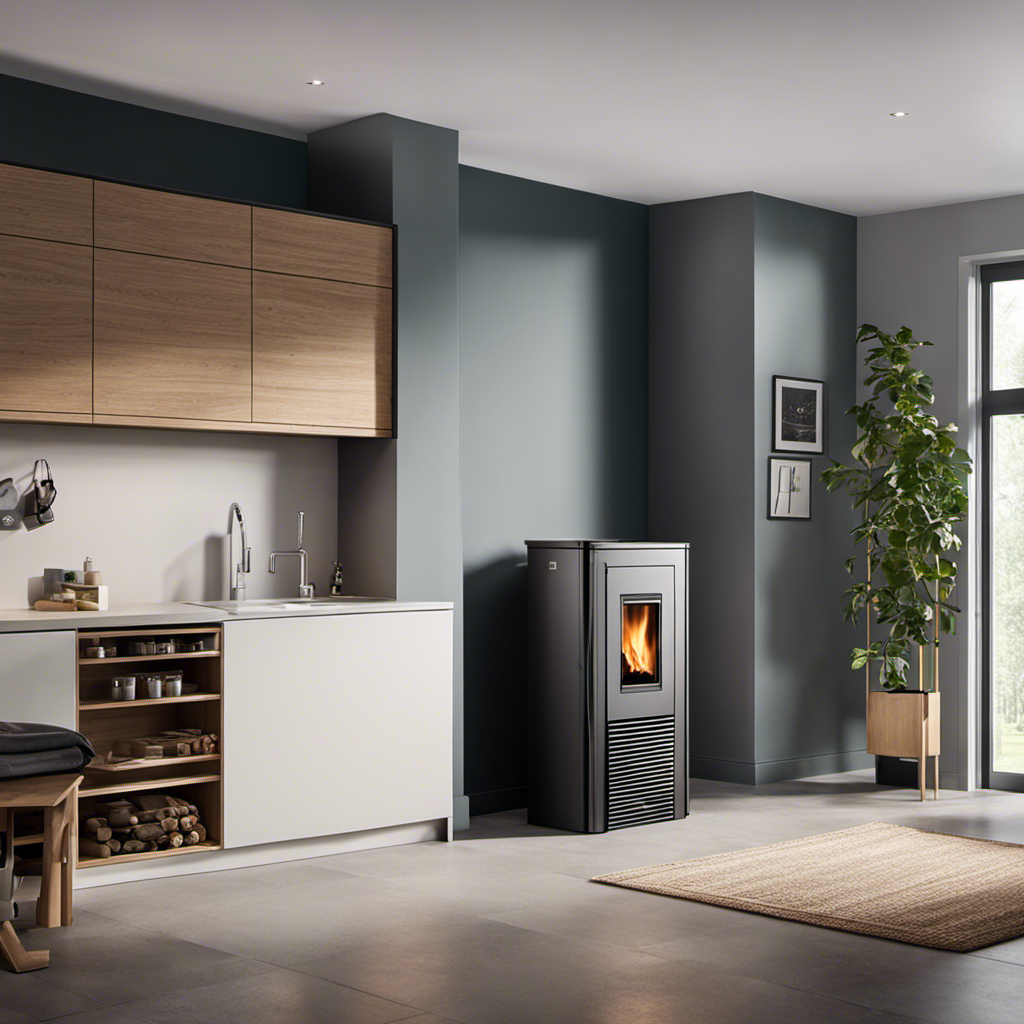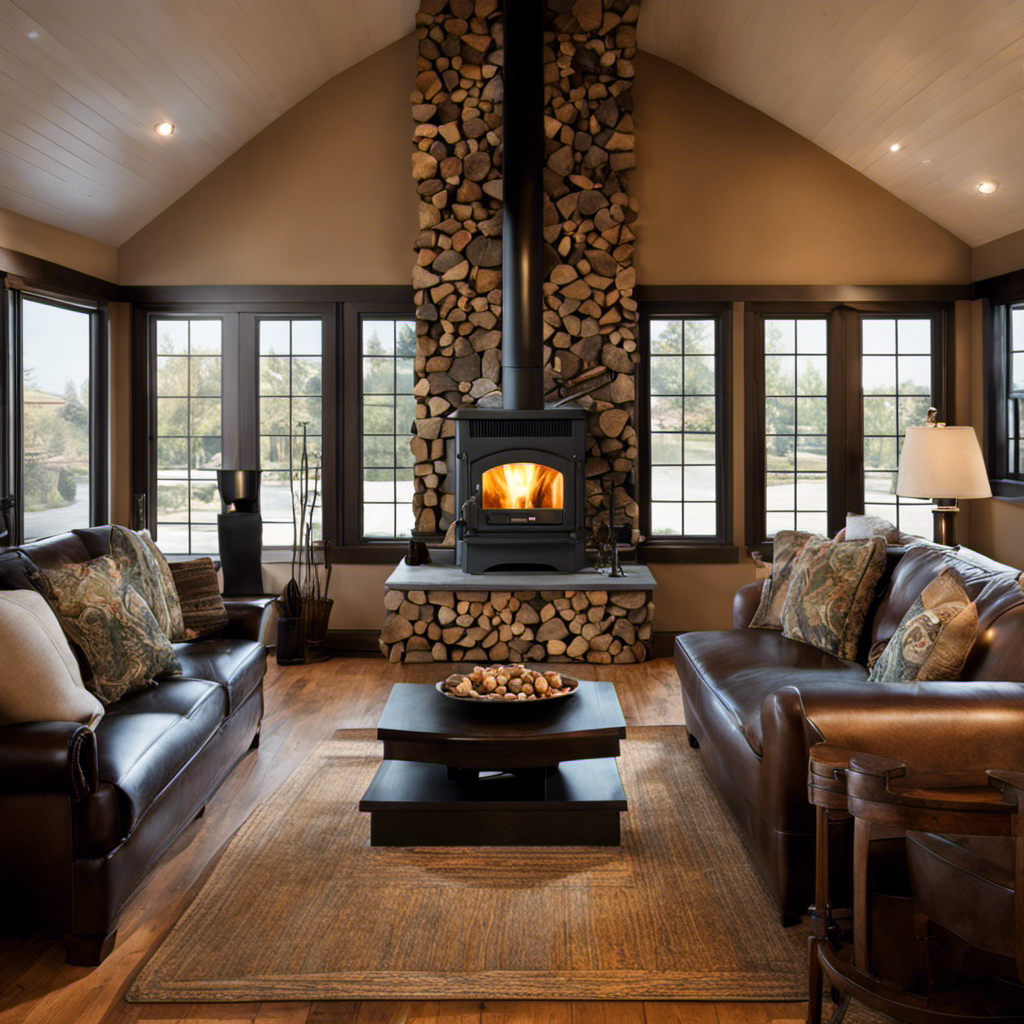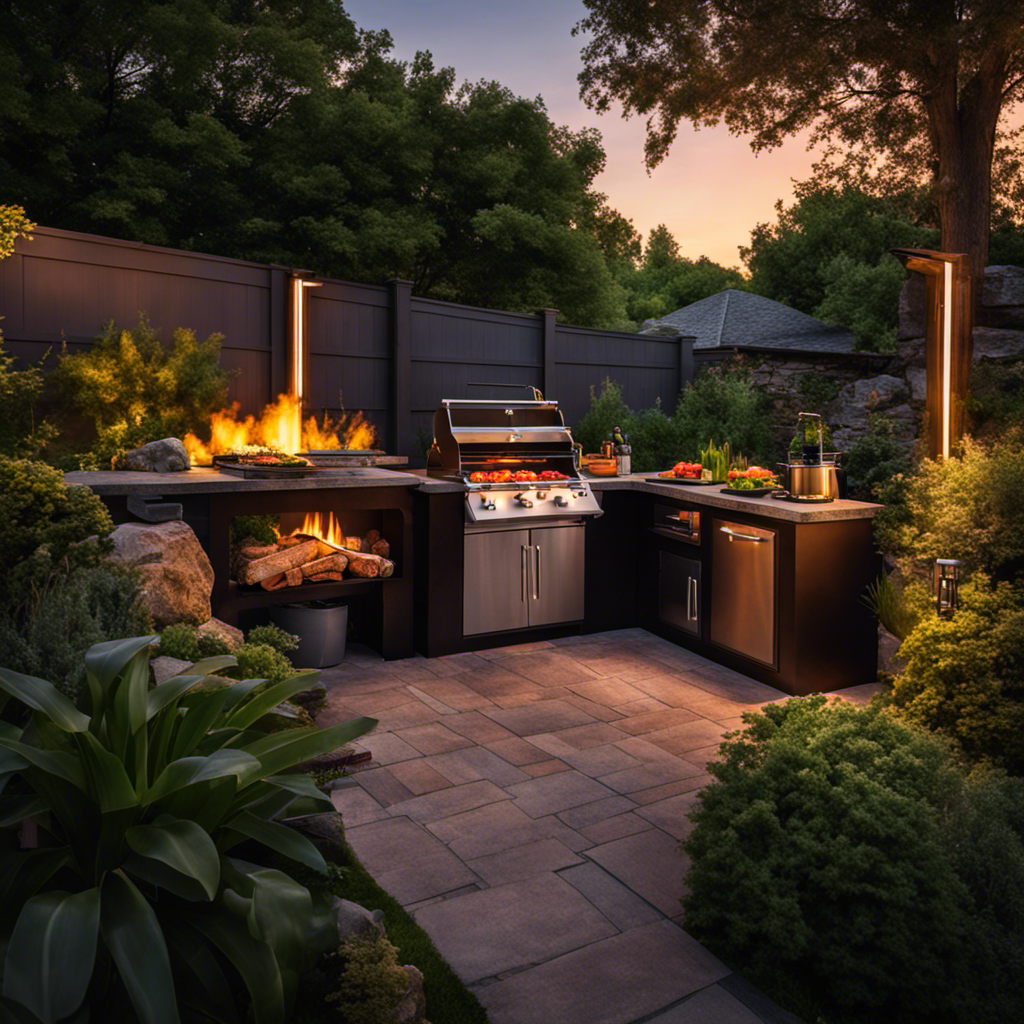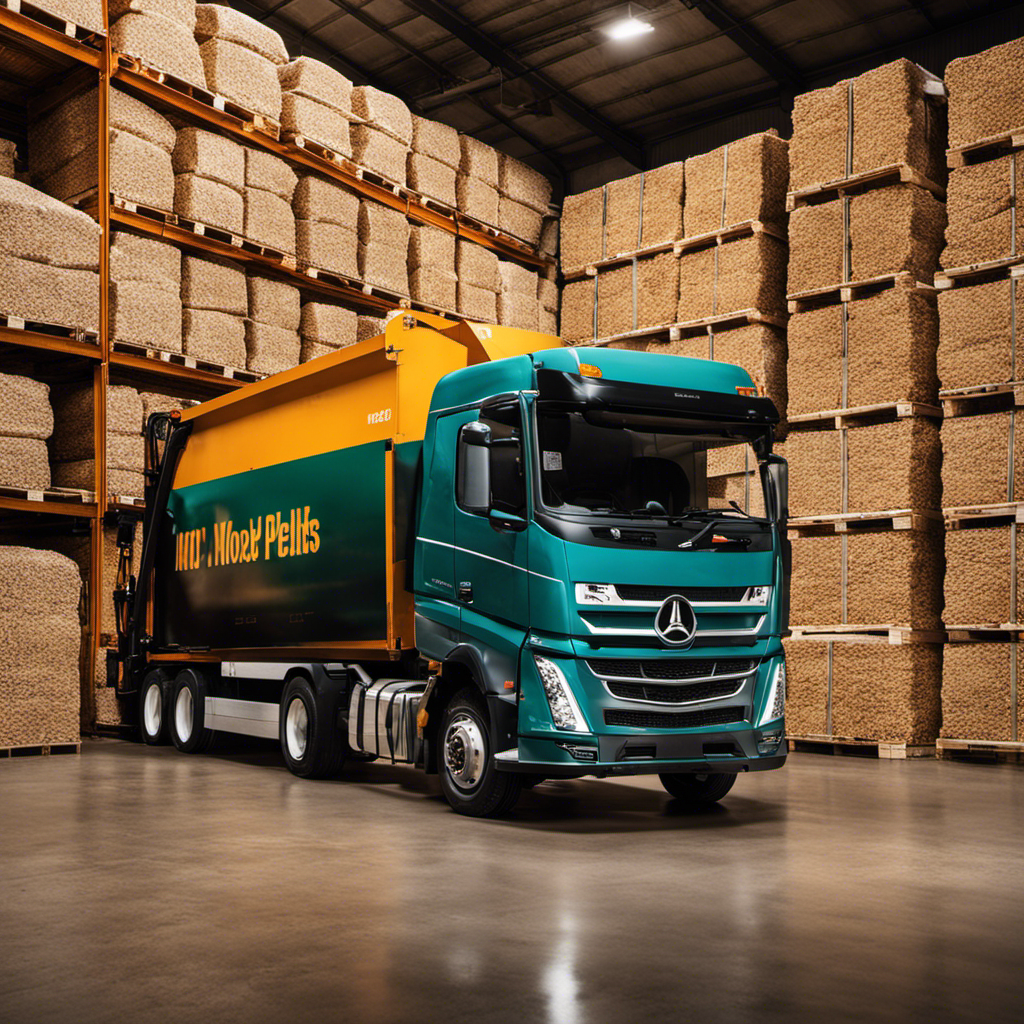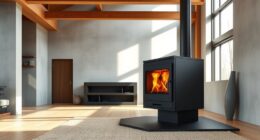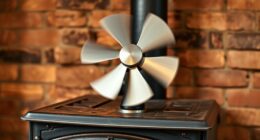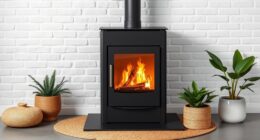I’ve always wondered about the expense involved in a standard home wood pellet boiler and water heater setup. Is it worth the investment?
In this article, I’ll break down the initial investment costs, installation expenses, maintenance and repair fees, fuel costs, and energy efficiency of these systems.
We’ll also explore government rebates and incentives, conduct a long-term cost analysis, and discuss considerations for cost-effective operation.
So, if you’re wondering how much it would cost to heat your home with wood pellets, keep reading for all the details.
Key Takeaways
- The typical cost range for a wood pellet boiler and water heater combo is $10,000 to $20,000, including purchase and installation.
- The payback period for the investment is estimated to be around 5-10 years, with significant savings on heating and hot water expenses after that.
- The installation timeline for the combo is typically 1-2 days, but it may vary based on system complexity and home size.
- Wood pellet boilers and water heaters maximize energy efficiency and utilize advanced technology to minimize energy consumption.
Initial Investment Costs
You can expect to pay around $10,000 to $20,000 for a typical house wood pellet boiler and water heater combo. This initial investment cost includes the purchase and installation of the system.
The fuel consumption of a wood pellet boiler is an important factor to consider when assessing its economic feasibility. On average, a wood pellet boiler consumes about 2-3 tons of wood pellets per year, depending on the size of the house and the climate.
The payback period for a wood pellet boiler and water heater combo can vary depending on factors such as fuel prices and energy consumption patterns. However, it is generally estimated to be around 5-10 years. Once the payback period is reached, homeowners can enjoy significant savings on their heating and hot water expenses.
Moving onto installation expenses, we need to analyze the costs associated with setting up this system.
Installation Expenses
Installing a boiler and water heater combo can be quite expensive, but the benefits and efficiency it provides make it a worthwhile investment. Here are some key points to consider:
-
Installation Timeline:
-
It typically takes around 1-2 days to complete the installation process.
-
This timeline may vary depending on the complexity of the system and the size of your home.
-
Energy Consumption:
-
A boiler and water heater combo is designed to maximize energy efficiency.
-
It utilizes advanced technology to minimize energy consumption and reduce utility bills.
By understanding the installation timeline and the energy-saving features of a boiler and water heater combo, homeowners can make an informed decision.
Now, let’s move on to discussing the maintenance and repair fees associated with this system.
Maintenance and Repair Fees
The cost of maintaining and repairing a boiler and water heater combo can vary depending on the brand and model. It is important to consider the maintenance requirements and warranty coverage when budgeting for these expenses.
Some brands may require more frequent maintenance, such as annual cleanings or filter replacements, which can add to the overall cost. Additionally, warranty coverage can play a significant role in reducing repair fees. It is advisable to choose a combo unit that offers a comprehensive warranty, covering both parts and labor for a specified period. This can potentially save you from costly repairs down the line.
Now, let’s delve into another important aspect of owning a wood pellet boiler and water heater combo: fuel costs.
Fuel Costs
When it comes to fuel costs, there are several key points to consider. First, price comparison options are important because they allow us to determine the most cost-effective fuel source for our needs. This is crucial in order to make informed decisions about our expenses.
Second, long-term cost savings are crucial for budget planning. By understanding the potential savings over the lifespan of a heating system, we can better plan for our financial future. This helps us avoid any unexpected expenses and ensures that we are making the most economical choices.
Lastly, conducting an environmental impact assessment is essential. This allows us to evaluate the ecological consequences of different fuel options and make informed decisions based on sustainability. It is important to consider the impact our choices have on the environment and strive to make choices that are environmentally friendly.
Price Comparison Options
To find out how much a typical house wood pellet boiler and water heater combo costs, you can compare prices from different suppliers. When considering the initial purchase of a wood pellet boiler and water heater combo, affordability is a key factor. Here are some options to help you determine the price range:
- Look for suppliers that offer competitive pricing
- Consider purchasing from local suppliers to potentially reduce transportation costs
By exploring these options, you can ensure that you are making an informed decision when it comes to the initial purchase of a wood pellet boiler and water heater combo.
However, it’s important to also consider the long-term cost savings associated with these systems. Transitioning into the subsequent section, let’s delve into the potential savings you can achieve over time.
Long-Term Cost Savings
Exploring different suppliers and considering local options can help you find a wood pellet boiler and water heater combo that fits your budget, allowing for long-term cost savings. These systems offer significant energy efficiency benefits, reducing your overall energy consumption and lowering utility bills.
To determine the potential savings, it is crucial to conduct a payback period analysis. This analysis will consider the initial cost of the system, any installation expenses, and the expected annual savings in energy costs. By comparing the upfront investment with the projected savings, you can determine how long it will take to recoup your initial investment. This information is essential for making an informed decision about the most cost-effective wood pellet boiler and water heater combo for your home.
Evaluating the environmental impact assessment of these systems will be discussed in the following section.
Environmental Impact Assessment
Considering the environmental impact of these systems is crucial for making an informed decision about which wood pellet boiler and water heater combo is best for you. When evaluating the environmental impact of a wood pellet boiler and water heater combo, there are several key factors to consider:
-
Carbon Footprint Reduction:
-
Wood pellets are a renewable energy source, as they are made from compacted sawdust and other wood waste.
-
Using wood pellets as fuel significantly reduces carbon emissions compared to fossil fuels, contributing to a greener and more sustainable energy system.
-
Renewable Energy Benefits:
-
Wood pellet boilers and water heaters utilize renewable energy sources, reducing reliance on non-renewable fossil fuels.
-
By using wood pellets, you contribute to the development and growth of the renewable energy sector, helping to create a cleaner and more sustainable future.
Considering these factors, it is evident that wood pellet boiler and water heater combos offer significant benefits in terms of carbon footprint reduction and renewable energy utilization. Transitioning to such systems can have a positive impact on the environment and contribute to a more sustainable energy future.
In the subsequent section about energy efficiency and savings, we will explore how these systems can also help homeowners save on their energy bills.
Energy Efficiency and Savings
The energy efficiency of a typical house wood pellet boiler and water heater combo can lead to significant savings on utility bills. These systems are designed to maximize the utilization of wood pellets, resulting in higher energy efficiency compared to traditional heating methods. The combustion process is optimized, ensuring minimal waste and maximum heat output. As a result, homeowners can experience reduced energy consumption and lower heating costs.
The energy efficiency benefits of these systems not only provide immediate savings but also contribute to long-term return on investment. By investing in a wood pellet boiler and water heater combo, homeowners can enjoy lower utility bills for years to come. Moreover, the reduced reliance on fossil fuels and the utilization of renewable wood pellets also contribute to a greener and more sustainable future.
Transitioning into the subsequent section about government rebates and incentives, it’s important to explore the financial support available to homeowners who choose these energy-efficient systems.
Government Rebates and Incentives
When it comes to government rebates and incentives for energy-efficient upgrades, there are key points to consider.
First, understanding the rebate eligibility criteria is crucial to determine if you qualify for financial assistance.
Second, exploring the financial savings potential of these programs can help you assess the long-term benefits of participating.
Lastly, familiarizing yourself with the application process details will ensure a smooth and efficient experience when applying for these rebates.
Rebate Eligibility Criteria
You might be wondering if you’re eligible for any rebates when purchasing a typical house wood pellet boiler and water heater combo. Well, let me break down the eligibility criteria for you:
-
Rebate Application Process:
-
Gather all necessary documents, such as proof of purchase and installation.
-
Fill out the rebate application form accurately and completely.
-
Eligibility Criteria:
-
Homeownership: You must be the owner of the property where the combo will be installed.
-
Energy Efficiency: The combo must meet the specified energy efficiency standards.
-
Installation by Certified Professional: The combo must be installed by a qualified professional.
Meeting these eligibility criteria will increase your chances of receiving a rebate for your wood pellet boiler and water heater combo purchase.
Now, let’s dive into the exciting topic of the financial savings potential associated with this eco-friendly heating solution.
Financial Savings Potential
Let’s explore the potential for saving money with this eco-friendly heating solution.
When considering the financial benefits of a wood pellet boiler and water heater combo, it is essential to analyze its energy consumption and payback period. Wood pellet boilers have significantly lower energy consumption compared to traditional fossil fuel-based systems. This reduction in energy usage can lead to substantial cost savings over time.
Additionally, the payback period for wood pellet boilers is relatively short, typically ranging from three to seven years. This means that the initial investment in the system is recouped relatively quickly through lower energy bills.
With these financial advantages, it is clear that opting for a wood pellet boiler and water heater combo can be a smart long-term investment.
As we delve into the application process details…
Application Process Details
The application process for this efficient heating solution is straightforward and can be completed in a few simple steps. To ensure a smooth application process, there are a few application requirements and documentation needed:
-
Application Requirements:
-
Proof of property ownership or authorization
-
Verification of eligibility for any applicable incentives or rebates
-
Documentation Needed:
-
Completed application form
-
Proof of income
-
Proof of residency
-
Technical specifications of the wood pellet boiler and water heater combo
-
Quotes or estimates from certified installers
Long-term Cost Analysis
The long-term cost analysis of a typical house wood pellet boiler and water heater combo should take into account maintenance, fuel expenses, and potential savings on energy bills.
When considering long term budgeting for this system, it is important to evaluate the return on investment. While the initial cost of installing a wood pellet boiler and water heater combo may be higher than traditional systems, the potential savings on energy bills can lead to significant cost savings over time.
Additionally, the maintenance costs for wood pellet systems are generally lower compared to other heating systems. The fuel expenses for wood pellets can vary depending on the region and availability, but they are often more cost-effective compared to fossil fuels.
By considering these factors, homeowners can make informed decisions about the long-term financial benefits of a wood pellet boiler and water heater combo.
Moving forward, it is important to also consider considerations for cost-effective operation.
Considerations for Cost-effective Operation
To ensure cost-effective operation, you should regularly schedule maintenance for your wood pellet heating system. This will not only help extend the lifespan of your equipment but also optimize its efficiency.
Here are some cost-saving strategies and energy consumption analysis considerations to keep in mind:
-
Maintenance:
-
Clean and inspect the combustion chamber and heat exchanger annually to remove any build-up that may hinder efficiency.
-
Check and clean the flue pipe and chimney to ensure proper airflow and prevent blockage.
-
Energy Consumption Analysis:
-
Monitor your system’s fuel consumption regularly to identify any sudden increases that may indicate a problem.
-
Consider investing in a smart thermostat or programmable controls to optimize your heating schedule based on occupancy patterns.
Frequently Asked Questions
Can a Typical House Wood Pellet Boiler and Water Heater Combo Be Used in Any Type of Home?
A wood pellet boiler and water heater combo can be used in various types of homes. It offers pros like energy efficiency and cost savings, but cons include the need for regular maintenance and limited availability of pellets.
Are There Any Specific Permits or Certifications Required for Installing a Wood Pellet Boiler and Water Heater Combo?
Permit requirements and the certification process are important considerations when installing a wood pellet boiler and water heater combo. It is crucial to comply with local regulations to ensure a safe and efficient installation.
How Often Do Wood Pellet Boilers and Water Heaters Require Professional Maintenance?
Wood pellet boilers and water heaters should be inspected annually by a professional. Common maintenance tasks include cleaning the combustion chamber, checking the exhaust system, and ensuring proper airflow. Regular maintenance ensures optimal performance and longevity of the equipment.
Can a Wood Pellet Boiler and Water Heater Combo Be Used as the Primary Heating System for a House?
Using a wood pellet boiler and water heater combo as the primary heating system has advantages like cost savings and environmental friendliness. However, drawbacks include initial installation costs and the need for regular maintenance.
Are There Any Limitations or Restrictions on the Type of Wood Pellets That Can Be Used in a Wood Pellet Boiler and Water Heater Combo?
When using a wood pellet boiler and water heater combo, there may be limitations or restrictions on the type of wood pellets that can be used. It is important to consult the manufacturer’s guidelines for specific requirements.
Conclusion
In conclusion, the cost of a typical house wood pellet boiler and water heater combo can vary depending on several factors. Initial investment costs, installation expenses, maintenance and repair fees, and fuel costs all play a role in determining the overall price.
However, by considering energy efficiency and potential savings, as well as government rebates and incentives, homeowners can make a cost-effective decision. Conducting a long-term cost analysis is crucial to understand the financial implications.
So, weigh all the considerations for a cost-effective operation and capitalize on the benefits of this sustainable heating solution.

